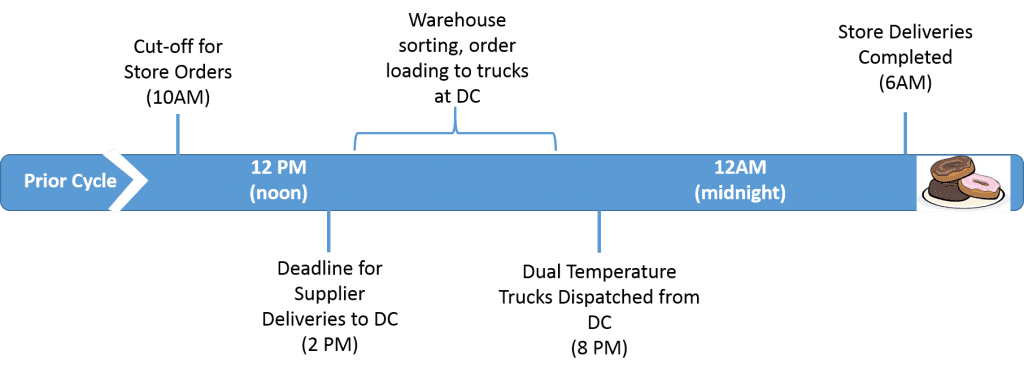In today’s competitive environment, more and more companies are placing increased focus on the processes that best support their competitive positioning. Concurrently, these same organizations are shifting responsibility for other processes to specialist organizations. The increased use of 3PLs for transportation, warehousing, and fulfillment is one example of this trend in specialization. The partnership between 7-Eleven and Exel in the fresh food channel is an interesting example of logistics outsourcing that has enhanced fulfillment processes and enabled top-line growth. Last week I attended the S&OP Innovation Summit in Boston, where executives from 7-Eleven and Exel discussed the processes that enable daily delivery of fresh food to over 8000 stores in the US and Canada.
In the 1990s, 7-Eleven stores were receiving fresh goods two to three times a week through direct-store delivery or wholesale channels. More recently, 7-Eleven developed its fresh delivery “demand chain” to service over 90 percent of its 8,200 stores in the US and Canada with daily delivery of fresh items. And deliveries to over 75 percent of these stores are handled by Exel, a 7-Eleven logistics partner. It is not just the scale and frequency of the operation that is impressive. This daily fulfillment process is demand-driven with order-to-delivery cycles shorter than 24 hours.
The Order-to-Delivery Cycle
Store operators utilize a handheld order terminal to review pertinent information such as past sales and to place orders for the next day. The orders for fresh food; including sliced fruit, sandwiches, donuts, and dairy; must be placed by 10am to obtain delivery by 6am the next morning. Orders entries from all stores within a territory are placed in a central system that is visible to fresh food vendors. As an aside, the final deliveries to stores is based on demand, not a push out. However, many food vendors such as bakers will pre-produce based on a forecast, then adjust based on demand. This is possible because single store variations are often smoothed out in aggregate. The fresh food vendors are then responsible for delivering the ordered items by 2pm to the combined distribution centers (CDCs) that are run by Exel or other 3PL partners (7-Eleven currently utilizes 25 of these “fresh goods” CDCs across the US). The CDC workforce sorts products by store destination and prepares orders to be loaded. The bakery and commissary deliveries are cross-docked and are usually the last items to be added to store shipments.
The orders are loaded onto dual-temperature box trucks at the CDCs and dispatched by 8pm. The box trucks, also run by Exel, average between 15 and 20 stops per night, with stops taking an average of 15 minutes. Store workers use a scanner to check in orders and this also serves as a record of sales history. The goal is for store deliveries to be completed by 6am in time for the morning rush. This process has provided the benefit of fresher products in 7-Eleven stores which has led to increased sales. The network of regional CDCs has served a critical role in this process, enabling vendors to deliver to a central location and 7-Eleven logistics partners to replenish stores on a daily, demand-pull basis.



















Leave a Reply